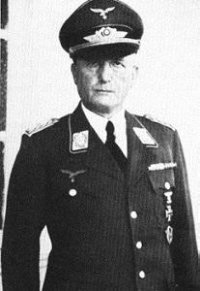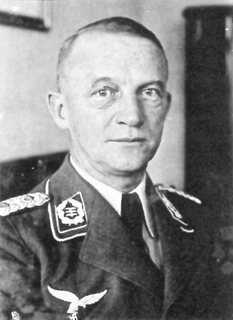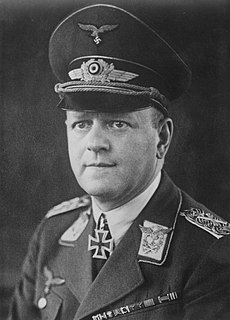 W
WAlexander Andrae, whose first name is often mistakenly given as Waldemar, was a German military officer from Kösling, Upper Silesia. Initially pursuing an Army career, he then joined the security police and eventually the Luftwaffe.
 W
WWilhelm Franz Josef Beiglböck was an internist and held the title of Consulting Physician to the German Luftwaffe (Airforce) during World War II.
 W
WBruno Bräuer was a general in the paratroop forces of Nazi Germany during World War II. He served as a commander on Crete and then commanded the 9th Paratroop Division. After the war, Bräuer was convicted of war crimes and executed, along with Friedrich-Wilhelm Müller, on the anniversary of the German invasion of Crete.
 W
WHellmuth Felmy was a German general and war criminal during World War II, commanding forces in occupied Greece and Yugoslavia. A high-ranking Luftwaffe officer, Felmy was tried and convicted in the 1948 Hostages Trial.
 W
WHermann Wilhelm Göring was a German politician, military leader and convicted war criminal. He was one of the most powerful figures in the Nazi Party, which ruled Germany from 1933 to 1945.
 W
WAlbert Kesselring was a German Generalfeldmarschall of the Luftwaffe during World War II who was subsequently convicted of war crimes. In a military career that spanned both world wars, Kesselring became one of Nazi Germany's most highly decorated commanders, being one of only 27 soldiers awarded the Knight's Cross of the Iron Cross with Oak Leaves, Swords and Diamonds.
 W
WAlexander Löhr was an Austrian Air Force commander during the 1930s and, after the annexation of Austria, he was a Luftwaffe commander. Löhr served in the Luftwaffe during World War II, rising to commander of Army Group E and then to commander-in-chief in Southeastern Europe.
 W
WKurt Mälzer was a German general of the Luftwaffe and a war criminal during World War II. In 1943, Mälzer was appointed the military commander of the city of Rome, subordinated to General Eberhard von Mackensen under the overall command of Field Marshal Albert Kesselring. Under his authority, Mälzer commanded not only the garrison Wehrmacht troops in Rome itself, but also indirectly the SS security forces in the city.
 W
WErhard Milch was a German Field Marshal who oversaw the development of the Luftwaffe as part of the re-armament of Nazi Germany following World War I. He was State Secretary in the Reich Ministry of Aviation and Inspector General of the Luftwaffe. During most of World War II, he was in charge of all aircraft production and supply. He was convicted of war crimes during the Milch Trial held before the U.S. military court in 1947 and sentenced to life imprisonment; he was released in 1954.
 W
WHermann-Bernhard Ramcke was a German general of paratroop forces during World War II. He led units in Crete, North Africa, Italy, the Soviet Union and France, and was captured by American forces at the conclusion of the Battle for Brest in September 1944. He was a recipient of the Knight's Cross of the Iron Cross with Oak Leaves, Swords and Diamonds, one of only 27 people in the Nazi German military so decorated.
 W
WGerhard August Heinrich Rose was a German expert on tropical medicine. Participating in Nazi human experimentation at Dachau and Buchenwald, he infected Jews, Romani people, and the mentally ill with malaria and typhus. Sentenced to life in prison, he was released in 1953.
 W
WKurt Arthur Benno Student was a German general in the Luftwaffe during World War II. An early pioneer of airborne forces, Student was in overall command of developing a paratrooper force to be known as the Fallschirmjäger, and as the most senior member of the Fallschirmjäger, commanded it throughout the war. Student led the first major airborne attack in history, the Battle for The Hague, in May 1940. He also commanded the Fallschirmjägers in its last major airborne operation, the invasion of Crete in May 1941. The operation was a success despite German losses, and led the Allies to hasten the training and development of their own airborne units.